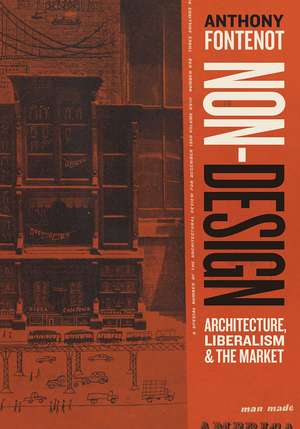Non-Design: Architecture, Liberalism, and the Market
Autor Anthony Fontenoten Limba Engleză Hardback – 9 iul 2021
Preț: 372.50 lei
Nou
Puncte Express: 559
Preț estimativ în valută:
71.28€ • 73.97$ • 59.58£
71.28€ • 73.97$ • 59.58£
Carte disponibilă
Livrare economică 25 februarie-11 martie
Livrare express 08-14 februarie pentru 58.85 lei
Preluare comenzi: 021 569.72.76
Specificații
ISBN-13: 9780226686066
ISBN-10: 022668606X
Pagini: 376
Ilustrații: 65 halftones
Dimensiuni: 178 x 254 x 38 mm
Greutate: 0.99 kg
Ediția:First Edition
Editura: University of Chicago Press
Colecția University of Chicago Press
ISBN-10: 022668606X
Pagini: 376
Ilustrații: 65 halftones
Dimensiuni: 178 x 254 x 38 mm
Greutate: 0.99 kg
Ediția:First Edition
Editura: University of Chicago Press
Colecția University of Chicago Press
Cuprins
Introduction
Chapter 1. Planned Order versus Spontaneous Order
Chapter 2. New Brutalism and the Critique of Socialism: Non-Design and the New Visual Order
Chapter 3. The Borax Debates: From Modern Design to Non-Design
Chapter 4. Spontaneous City: Jane Jacobs and the Critique of Planned Order
Chapter 5. Chaos or Control: Non-Design and the American City
Chapter 6. The Indeterminate City
Conclusion
Chapter 1. Planned Order versus Spontaneous Order
Chapter 2. New Brutalism and the Critique of Socialism: Non-Design and the New Visual Order
Chapter 3. The Borax Debates: From Modern Design to Non-Design
Chapter 4. Spontaneous City: Jane Jacobs and the Critique of Planned Order
Chapter 5. Chaos or Control: Non-Design and the American City
Chapter 6. The Indeterminate City
Conclusion
Acknowledgments
Notes
Index
Notes
Index
Recenzii
"Detailed and fascinating . . . An excellent book. The writing is scholarly, yet readable and engaging, and Fontenot’s skillful use of quotations from contemporary periodicals, such as Architectural Review, Architectural Design, and New Society, brings the critique of modernism to life."
"Fontenot, who teaches architecture at Woodbury University, wrote a fascinating book arguing that economic thinking can influence architecture and design, and it did. . . . Even the reader who disagrees the most vehemently with Fontenot could learn a lot from a book which provides the reader with such an impressive amount of information."
“Fontenot’s stunningly erudite and deeply researched book is a landmark contribution to the study of the built environment and establishes him as one of the field's most perspicacious intellectual historians. Its explication of myriad connections among economic thinkers and the disciplines of architecture and urbanism transforms previous understandings and will doubtless foster renewed and refined discussions of monopolies in the twenty-first century. Non-Design is an uncommonly bracing, audacious, and provocative work of historical scholarship.”
“In his thoroughly researched tome, Fontenot shapes an innovative vision of postwar architecture. Considering the critical discourse and the practical responses that have challenged the dominion of central planning and functional design, he weaves together well-chosen British and North American episodes marking the emergence of a deliberate denigration of modern design.”
“Rich in ideas, edifying in its connecting lines, Fontenot’s survey of mid-twentieth-century (non)planning theory is a masterful compendium of urban discussions holding significant relevance today.”
"Recommended. Urban design and city planning receive limited attention in discussions of modern architecture despite their undeniable importance to architectural design in the urban environment. Fontenot aims to elevate these topics within the larger discussion by examining the important social theories and trends that have influenced urban design and planning since WW II. Fontenot explores the critical reactions in mid-twentieth century urban design discourse to earlier Utopian, socialist-inspired urban planning and design theories familiar to students of twentieth-century architecture. But he broadens the topic by proposing intellectual connections between the proponents of what was known as “non-design” in urban architecture and the theories of market-driven decisions in organized human activities described by Friedrich Hayek. . . These and other comparisons between market-driven and urban design theories should generate considerable discussion."
